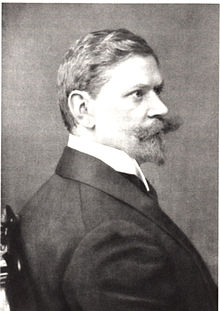Alexander Tille
(Franz) Alexander Tille (* 30th March 1866 in Lauenstein , † 16th December 1912 in Saarbrücken ) was a German Germanist , philosopher and officials of business associations. His pseudonym was Alexander Lauenstein .
Life
Tille came from a Protestant pastor's family. His younger brother was the archivist, librarian and historian Armin Tille . After attending the Princely School in Grimma , Alexander Tille studied German and English philology and philosophy at the University of Leipzig from 1886 to 1890 . In 1890 he received his doctorate with a dissertation on "The German folk songs from Doctor Faust". From 1890 he was a lecturer in German at the University of Glasgow . Due to ideological disputes with British students in connection with the Boer War , he gave up his teaching position in 1900. In the following years he represented the interests of large-scale industry in Berlin as deputy managing director of the Central Association of German Industrialists . From 1901 he began to publish the political speeches of the Saarland industrialist and politician Carl Ferdinand Freiherr von Stumm-Halberg . From 1903 until his death he was in-house counsel at the Saarbrücken Chamber of Commerce and managing director of several industrial associations.
plant
During his time in Glasgow he published books in German on Social Darwinism as well as newspaper articles on the same subject and contemporary British economy and society. In 1896 he published the first English translation of " Also sprach Zarathustra ", in the following years he wrote introductions to other English translations of Nietzsche's works , in which he portrayed Nietzsche in particular as a social Darwinist. In his main philosophical works, the book “People's Service” published anonymously (“by a social aristocrat”) in 1893 and the treatise on “Darwin and Nietzsche (A Book of Development Ethics)” that appeared two years later, Tille largely rejects what happened in the course of the cultural development of humanity established humane ethical principles with reference to their "unnaturalness" or their allegedly progress-limiting or progress-preventing effect. He also criticized philosophers like Ernst Haeckel and Herbert Spencer , who postulated the compatibility of progress and humanity on a developmental basis . Tille, on the other hand, negated this compatibility and considered progress to be absolutely preferable.
fist
Alexander Tille not only wrote his dissertation on the Faust material, but also submitted numerous other scientific papers on this topic. He also put together a book collection of around 700 works, which is now kept as part of the Faust collection in the Duchess Anna Amalia Library in Weimar . In 1913 it was first in the Goethe and Schiller Archives , then together with Gerhard Stumme's Faust collection in the Central Library of German Classics.
Works (selection)
- The Bode'sche Faust Library. In: Allgemeine Zeitung Munich, supplement. 1892, 197 (Aug. 24), pp. 4-7.
- The German folk songs by Doctor Faust. Halle aS: Niemeyer, 1890. Leipzig, Univ., Phil. Fac., Inaug.-Diss., 1890.
- To the Faust legend. In: Vierteljahrschrift für Litteraturgeschichte 5.1892.1, pp. 137–140.
- The splinters of fist in literature of the sixteenth to eighteenth centuries. Berlin: Felber / Erfurt: Ohlenroth, 1900.
- Goethe's Faust in French Art. With a switch-on picture and 13 text illustrations. In: Velhagen & Klasings Monatshefte 14 (1899/1900), 1, pp. 581-594.
- New fist splinters from the XVI., XVII. and XVIII. Century. In: Journal for Comparative Literature History 9 (1895), pp. 49–80.
- New fist splinters from the XVI., XVII. and XVIII. Century. In: Journal for Comparative Literature History 9 (1896), 1/2, pp. 61–72.
- The story of German Christmas. Leipzig 1893.
literature
- Fritz Hellwig : Alexander Tille. In: Peter Neumann (Ed.): Saarländische Lebensbilder. Volume 4. Saarbrücker Druck und Verlag, Saarbrücken 1989, ISBN 3-925036-20-2 , pp. 155-190.
- Fritz Hellwig: Alexander Tille (1866–1912). In: Barbara Gerstein, Ulrich S. Soénius (Red.) Rhenish and Westphalian Chamber of Commerce secretaries and syndici from the 18th to the beginning of the 20th century (= Rheinisch-Westfälische Wirtschaftsbiographien. Vol. 15 = Publications of the Historical Commission for Westphalia. Vol. 17, B). Aschendorff, Münster 1994, ISBN 3-402-06751-X , pp. 296-321.
- Wilfried Schungel: Alexander Tille (1866–1912). Life and ideas of a social Darwinist (= treatises on the history of medicine and natural sciences. Vol. 40). Matthiesen, Husum 1980, ISBN 3-7868-4040-7 .
Web links
- Literature by and about Alexander Tille in the catalog of the German National Library
- Literature on Alexander Tille in the Saarland Bibliography
- Alexander Tille in the Saarland biographies
- Alexander Tille in the Saxon Biography
Individual evidence
- ^ Saxon biography: Alexander Tille (1866–1912) , accessed on October 29, 2016.
| personal data | |
|---|---|
| SURNAME | Tille, Alexander |
| BRIEF DESCRIPTION | German Germanist, philosopher and functionary of business associations |
| DATE OF BIRTH | March 30, 1866 |
| PLACE OF BIRTH | Lauenstein , Ore Mountains |
| DATE OF DEATH | December 16, 1912 |
| Place of death | Saarbrücken |
